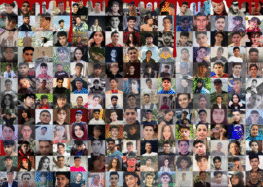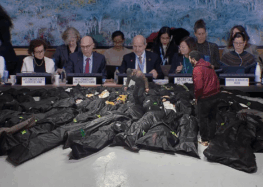XIII International Human Rights Colloquium
*This post will be updated regularly throughout the conference.
UPDATE Day 6, October 18: Civil Society
The final day of the Colloquium covered the question of civil society and sustainability. Is the changing landscape affecting the sustainability of NGOs? What are possible models and tools for NGOs in the new global order?
Several foundations and funders’ coalitions gave presentations to the collected representatives of civil society and human rights NGOs from the global south. In particular, Ford Foundation representative Louis Bickford presented a changing map of human rights activism as well as funding.The map depicting the flow of information, activism, advocacy, and funding from several decades ago was a simple symbiotic flow of information and activism from the south going north, and advocacy and funding from the north returning south. The updated current map showed, in addition to this basic flow, an intricate network of information, activism, funding, and advocacy linking multiple nodes within the global south and the global north. Two Brazilian foundations also spoke about local investment, the state of “social investment” of philanthropy, and corporate social investment.
After the presentations, attendees participated in a moderated discussion punctuated by audience surveys about the interplay between international, regional, national, local, and grassroots organizations and communities all working towards human rights. As Miguel Pulido of Fundar explained, “The party is the same, but we don’t all dance in the same style.”
Finally, attendees divided into working groups by language to determine actionable steps they and their organizations can take to improve the reach of human rights in their countries. As this was the last day of the Colloquium, the group gathered for final remarks and to exchange lessons learned. A video of highlights from the Colloquium will soon be available at the website of Conectas Human Rights.
***
UPDATE Day 5, October 17: Systems
As the discussion of “a new world order in human rights” continued, panelists today questioned how much the world order has changed. Amidst much discussion of the significance of the BRICS countries, Julie de Rivero of Human Rights Watch gave an innovative and entertaining presentation breaking down the United Nations Human Rights Council. Her presentation offered participants a new vocabulary to discuss and approach the members of the council.
De Rivero broke the UNHRC members into six categories, as follows:
1) “Nice Guys” — The “Nice Guys” are countries that almost always vote in favor of human rights, including supporting Special Rapporteur mandates, fact finding missions, etc. While these countries may not have the best human rights records at home, they are very supportive at the council. The “Nice Guys” include Mexico, Argentina, Uruguay, Norway, Mauritius, Botswana, Senegal, Sierra Leone, Maldives, Switzerland, Japan, and South Korea. Currently, there are 15 “Nice Guys” in the UNHRC.
2) “Cowboy” — The “Cowboy” defends its friends and allies but also exhibits strong leadership on many human rights issues. Strong double-standards. The 1 “Cowboy” is, of course, the United States, which is currently in the UNHRC.
3) “ICG – Internal Consensus Group” — The “ICG” is so busy discussing things internally and trying to build consensus that it rarely takes any leadership on human rights issues. The “ICG” countries tend to vote like “Nice Guys,” but they don’t take any leadership on human rights issues. The “ICG” countries are all members of the European Union. Currently, there are 9 “ICG” countries in the UNHRC.
4) “Sovereignty Patrol” — The “Sovereignty Patrol” does everything it can to prevent interference in the domestic affairs of other countries. The “Sovereignty Patrol” includes China, India, Iran, Sri Lanka, Cuba, Nicaragua, Venezuela, Algeria, and Egypt. Currently, there are 10 “Sovereignty Patrol” countries in the UNHRC.
5) “Grumpy Cat” — The “Grumpy Cat” countries say they embrace human rights and often have human rights enshrined in their constitutions. However, they are always contesting country-specific resolutions. They seem unable to have a coherent approach, but they vote begrudgingly for human rights issues, especially when pressured by their domestic civil society. “Grumpy Cat” countries include South Africa, Indonesia, and the Philippines. Currently, there are 11 “Grumpy Cat” countries in the UNHRC.
6) “Friendly Amazonian Parrot” — The “Friendly Amazonian Parrot” flits between “Nice Guys” and “Grumpy Cats” constantly repeating the word, “cooperation!” The “Friendly Amazonian Parrot” votes like a “Nice Guy,” due to the mobilization of its civil society holding it accountable for its votes, but internally seems to feel more like a “Grumpy Cat.” The “Friendly Amazonian Parrot” is, of course, Brazil, which is currently in the UNHRC.
De Rivero emphasized that it is civil society that can influence countries to vote for human rights at the UNHRC, turning “Grumpy Cats” into “Nice Guys,” and encouraged the participants to continue to press their respective governments for accountability in human rights.
***
UPDATE Day 4, October 16: Economy

Even the lunch involved questions of economy and human rights. Participants each received R$0.25 and were presented with three options for lunch. Each option involved a fictional multinational corporation, and participants could read about the companies’ claims and realities regarding their human rights practices before selecting which lunch to purchase.
On the first rainy day since the conference began, participants explored the theme of economy. Through an interactive panel and discussion session, they examined how to deal with the effects of the new economic centers from the perspective of protection and observance of human rights.
Participants heard presentations by Marisa Viegas e Silva of Global Justice (Brazil), Bongumusa Sibiya of the Legal Resource Centre (South Africa), David Kinley of the University of Australia (Australia), and Kristen Genovese of the Center of International and Environmental Law (USA). Many of the presentations discussed different ways to use national laws to litigate against transnational corporations that are violating human rights.
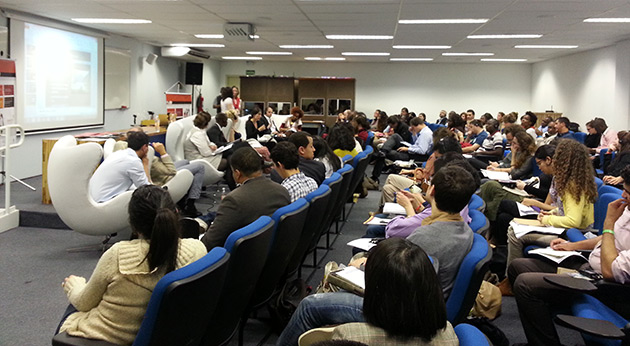
Participants then had the opportunity to join the panelists in an innovative question and answer session in which the questioners joined the panelists and became presenters themselves. One question that many speakers returned to was, “What type of economic system do we want for the world?”
In the evening, Colloquium participants joined an open dialogue with Brazilian social movements as the Extraordinary International Commission on Human Rights and Minorities held its session. Representatives from several local social movements, including the popular committee for the World Cup, indigenous people’s rights organizations, prisoners’ rights organizations, representatives from the recent and ongoing street protests in Brazil, provided testimony.
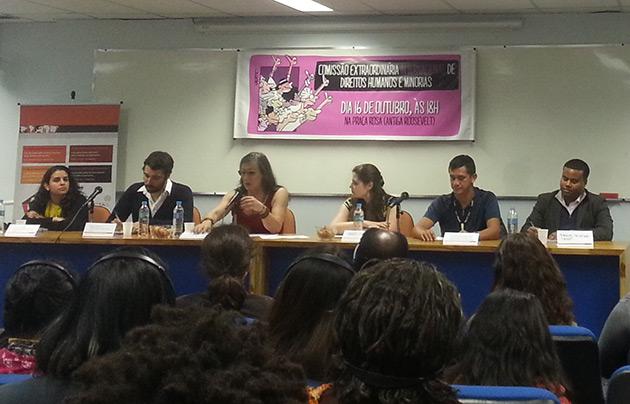
***
UPDATE Day 3, October 15: Inconsistencies
Today the XIII International Human Rights Colloquium focused on the inconsistencies between countries’ domestic and international policies. The day opened with a panel discussion, featuring Rogério Sotilli of the São Paulo Commission on Human Rights in Brazil; Camila Asano of Conectas in Brazil; Leili Kashani of the Center on Constitutional Rights in the United States; and Gastón Chillier of the Center for Legal Studies in Argentina.
The panelists spoke about specific domestic policies of their respective countries that directly contradict their countries’ stances on the international stage. Particularly moving was Kashani’s presentation on the US’s Guantánamo detainment camp, which remains open after nearly 12 years and continues to hold nearly 200 men without charges.
After the panel discussion, participants separated into groups to discuss different aspects of inconsistent domestic and international policies. In the group the Campaign participated in—nicknamed the “axis of evil” since this group consisted of representatives of Iran, Iraq, Egypt, China, Palestine, and Australia—participants explored the issue of governments misunderstanding the concept of human rights in their domestic implementation thereof.
One of the questions raised was whether it is easier to amend existing laws and institutions, or to create new ones. Participants also discussed the existence of space within international human rights treaties that allows countries to continue abusing human rights domestically, and explored ways in which civil society could exploit those very inconsistencies to embarrass human rights violators on the international stage.
After the smaller sessions, participants joined in larger groups divided by language to share experiences and learn from each others’ successes and failures in managing similar issues in different countries and regions.
***
UPDATE Day 2, October 14: TEDxRuaMonteAlegre

TEDxRuaMonteAlegre, with the theme of Multipolarity, was held at TUCA, the theater of the Pontifîcia Universidade Catolica in São Paulo
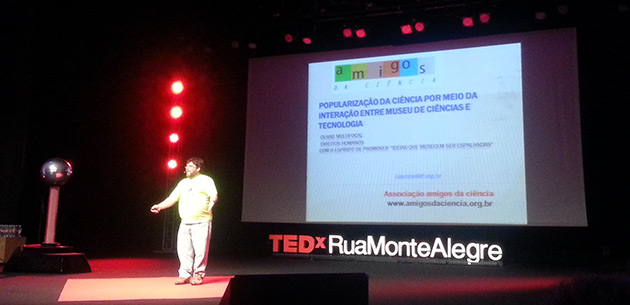
The TEDx event on multipolarity began with a talk by physicist Luís Roberto Batista of the Association of Friends of Science, who demonstrated multipolarity in electrical fields using a Van der Graaf generator.
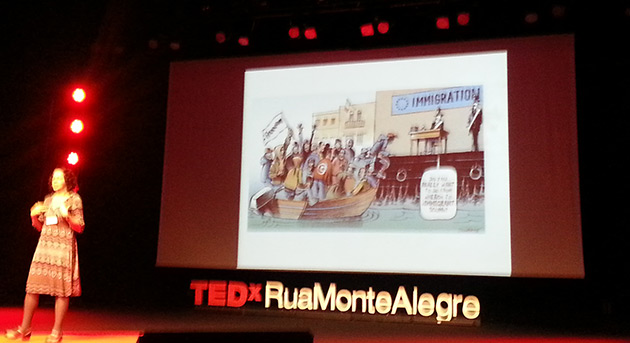
Deisy Ventura of São Paulo University spoke passionately about migration and human mobility.
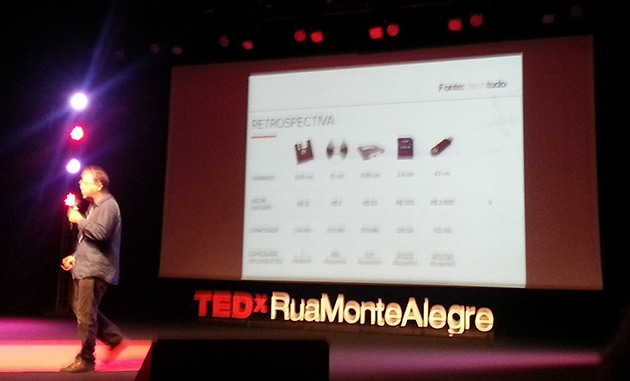
From the Federal University of ABC, Sérgio Amadeu da Silveira presented statistics about worldwide Internet use, surveillance by governments and private companies, and the erosion of privacy rights in the modern world.
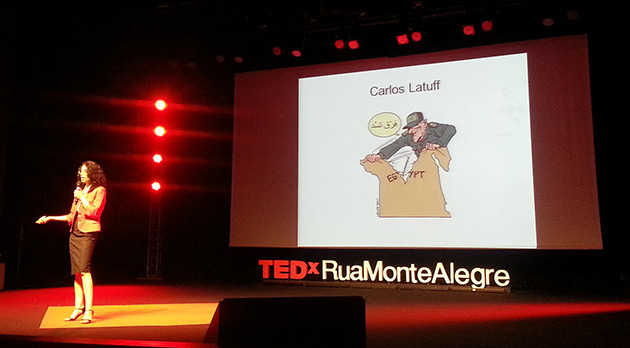
Al Jazeera’s correspondent in Venezuela, Syrian journalist Dima Khatib, presented the difficulties of communicating news and current events between global south countries without going through “the filter of the north.”
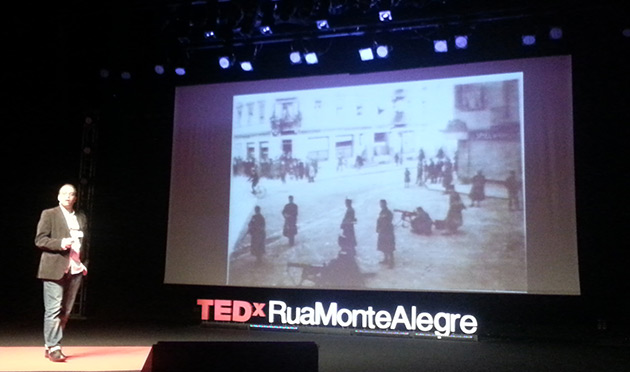
Hossam Bahgat, from the Egyptian Initiative for Personal Rights, presented about the emerging power of the street and public protests around the world. “Protests are beautiful. They are a healthy democratic exercise,” he said. “They are essential for real democracy.”
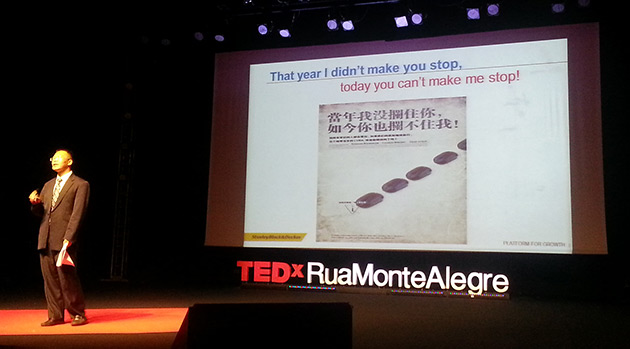
Lawyer, writer, and human rights advocate Teng Biao from China Against Death Penalty gave a moving talk about the change that is needed in China. “You can crush the flowers, but you can’t stop the spring,” he said.
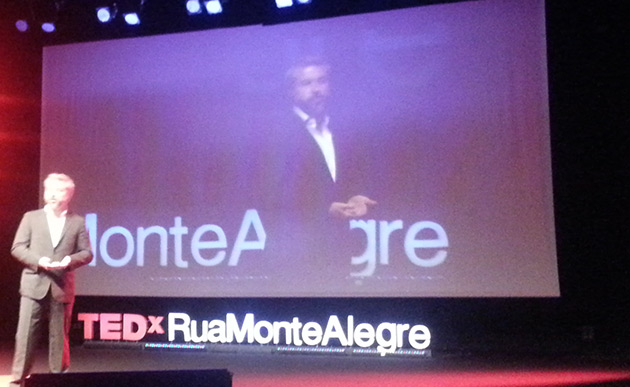
Murilo Vieira Komniski, head of the International Affairs Department of the General Secretariat of the Presidency of Brazil, spoke about Brazil’s history of human rights activism and its role in implementing the Universal Periodic Review at the United Nations.
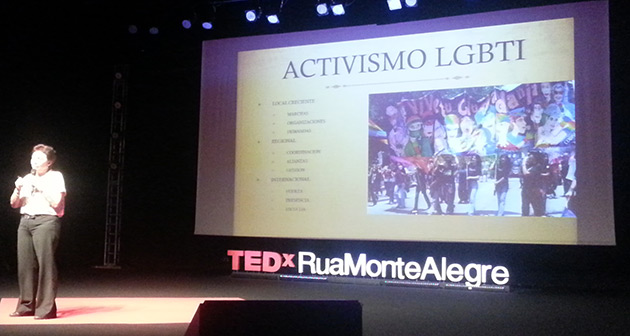
Feminist and social psychology professor Gloria Careaga from the National Autonomous University of Mexico gave a presentation about international LGBTI rights. “The rights of women and LGBTI people have always been at the mercy of politics,” she said.
TEDxRuaMonteAlegre screened this talk by Trita Parsi on Iran and Israel during the conference. Parsi originally gave the talk at the TED conference in California in June 2013.
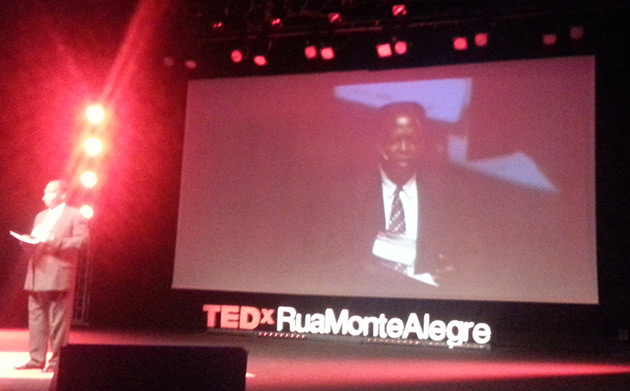
Human rights lawyer Salih Mahmoud Osman from Sudan spoke fiercely about Darfur and the failure of the international community to prevent the atrocities there or to stop them. He called for justice, and asked the world to bring Darfur back into the spotlight to bring the perpetrators to justice.

Julie de Rivero of Human Rights Watch told the moving stories of two North Koreans who escaped from forced labor camps. In contrast to today’s discussions of multipolarity, she said, North Korea is the most isolated country in the world.
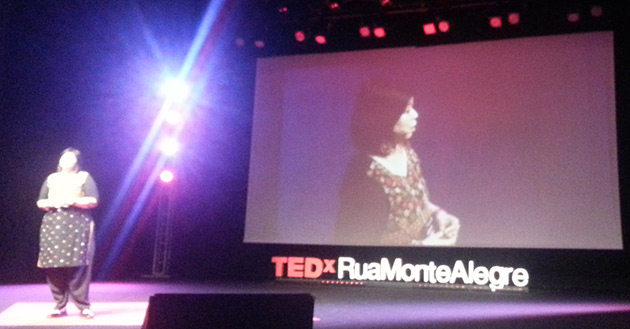
Debbie Stothard of the International Federation for Human Rights warned about the influence of global business on human rights, and the failure of states to protect the rights of their citizens. “People who used to fear soldiers with guns now have to fear men with briefcases backed up by soldiers with guns,” she said.
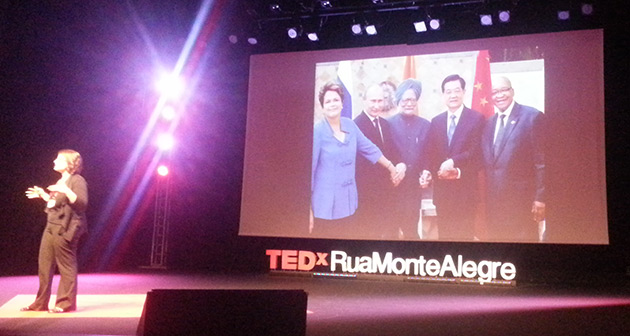
Executive Director of Conectas Human Rights Lucia Nader closed the TEDx with a discussion of the BRICS countries—Brazil, Russia, India, China, and South Africa. Quoting Spiderman, she said, “With great power comes great responsibility.”
***
UPDATE Day 1, October 13: XIII International Human Rights Colloquium
The first day of the XIII International Human Rights Conference kicked off with a peaceful picnic in one of São Paulo’s most beautiful parks, Ibirapuera Park. Over 100 participants, each wearing colored bracelets to designate their preferred language, met each other and enjoyed lunch in the sunshine. Afterwards, the participants separated into groups, some enjoying outdoor activities like hiking and yoga, and others touring the Afro-Brazilian Museum.
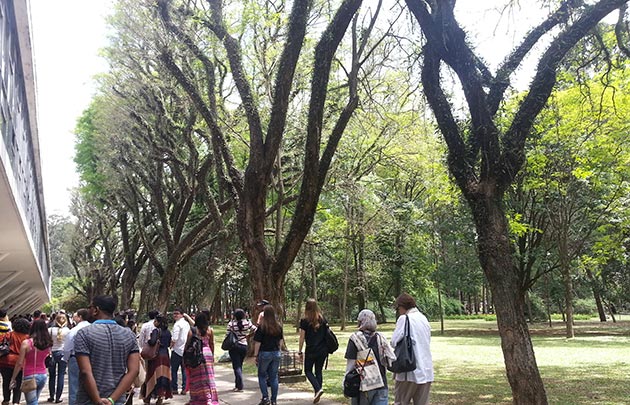
In the Portuguese-language museum tour, participants viewed artworks and historical artifacts from Brazil’s rich African culture. The participants on this tour, largely from South America and Africa (as well as the representative from the International Campaign for Human Rights in Iran), learned about and discussed the historical and present influences of different African cultures on Brazilian society. After the tour, attendees enjoyed live Brazilian music by a skilled trio playing classical guitar, clarinet, and tambourine.

Tomorrow, the participants of the XIII International Human Rights Conference will attend TEDxRuaMonteAlegre. Focusing on the theme of multipolarity, the TEDx will include speakers from the XIII International Human Rights Conference.
***
Day 0, October 12: Emerging Powers’ Bilateral Influence on Human Rights
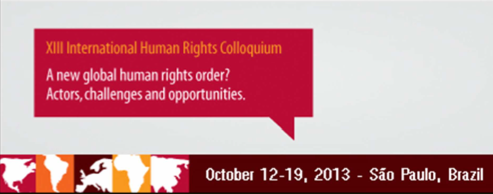
Over 100 human rights advocates from 40 countries are convening in São Paulo, Brazil, from October 12 to 19, to discuss “A New Global Order in Human Rights? Actors, Challenges and Opportunities” at the 13th International Human Rights Colloquium organized by Conectas Human Rights.
On the eve of the thirteenth annual International Human Rights Colloquium organized by Conectas Human Rights, civil society and human rights organizations from across the globe participated in a side meeting focusing on emerging powers’ bilateral influence on human rights.
On Saturday, October 12, participants from 14 organizations, representing the civil societies of 11 countries, met in São Paulo with four objectives: to map the channels and spheres of influence emerging powers can have on human rights promotion and protection abroad; to deepen understanding of emerging powers’ bilateral influence on human rights abroad; to develop a menu of possible measures emerging powers might adopt to promote pro-human rights change abroad through their bilateral relations; and to share experiences on how civil society organizations can successfully advocate for those measures to be taken.
Over a day of meetings, participants worked together to fine-tune a model for bilateral relations between Brazil and other countries in the world. The discussion especially focused on how emerging powers countries, particularly Brazil, can influence the human rights discourse and actions of other countries bilaterally, utilizing one-on-one diplomacy with human rights violators in addition to the traditional multilateral approach at global and regional organizations like the United Nations and the Organization of American States.
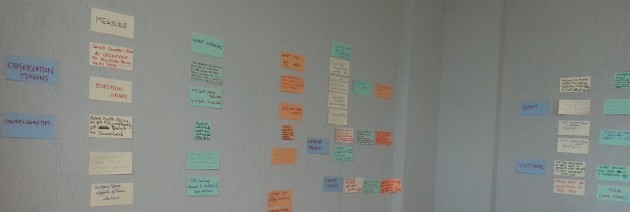
At the end of the meeting, participants collected over 15 concrete examples of measures civil society can take to promote human rights in their own and other countries.

